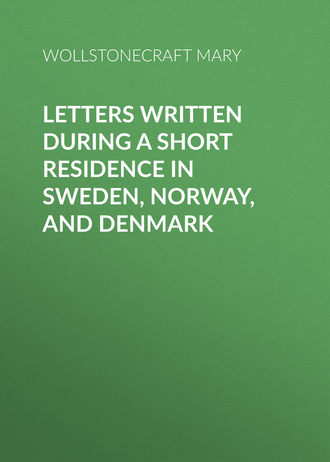
Wollstonecraft Mary
Letters Written During a Short Residence in Sweden, Norway, and Denmark
LETTER VIII
Tonsberg was formerly the residence of one of the little sovereigns of Norway; and on an adjacent mountain the vestiges of a fort remain, which was battered down by the Swedes, the entrance of the bay lying close to it.
Here I have frequently strayed, sovereign of the waste; I seldom met any human creature; and sometimes, reclining on the mossy down, under the shelter of a rock, the prattling of the sea amongst the pebbles has lulled me to sleep—no fear of any rude satyr’s approaching to interrupt my repose. Balmy were the slumbers, and soft the gales, that refreshed me, when I awoke to follow, with an eye vaguely curious, the white sails, as they turned the cliffs, or seemed to take shelter under the pines which covered the little islands that so gracefully rose to render the terrific ocean beautiful. The fishermen were calmly casting their nets, whilst the sea-gulls hovered over the unruffled deep. Everything seemed to harmonise into tranquillity; even the mournful call of the bittern was in cadence with the tinkling bells on the necks of the cows, that, pacing slowly one after the other, along an inviting path in the vale below, were repairing to the cottages to be milked. With what ineffable pleasure have I not gazed—and gazed again, losing my breath through my eyes—my very soul diffused itself in the scene; and, seeming to become all senses, glided in the scarcely-agitated waves, melted in the freshening breeze, or, taking its flight with fairy wing, to the misty mountain which bounded the prospect, fancy tripped over new lawns, more beautiful even than the lovely slopes on the winding shore before me. I pause, again breathless, to trace, with renewed delight, sentiments which entranced me, when, turning my humid eyes from the expanse below to the vault above, my sight pierced the fleecy clouds that softened the azure brightness; and imperceptibly recalling the reveries of childhood, I bowed before the awful throne of my Creator, whilst I rested on its footstool.
You have sometimes wondered, my dear friend, at the extreme affection of my nature. But such is the temperature of my soul. It is not the vivacity of youth, the heyday of existence. For years have I endeavoured to calm an impetuous tide, labouring to make my feelings take an orderly course. It was striving against the stream. I must love and admire with warmth, or I sink into sadness. Tokens of love which I have received have wrapped me in Elysium, purifying the heart they enchanted. My bosom still glows. Do not saucily ask, repeating Sterne’s question, “Maria, is it still so warm?” Sufficiently, O my God! Has it been chilled by sorrow and unkindness; still nature will prevail; and if I blush at recollecting past enjoyment, it is the rosy hue of pleasure heightened by modesty, for the blush of modesty and shame are as distinct as the emotions by which they are produced.
I need scarcely inform you, after telling you of my walks, that my constitution has been renovated here, and that I have recovered my activity even whilst attaining a little embonpoint. My imprudence last winter, and some untoward accidents just at the time I was weaning my child, had reduced me to a state of weakness which I never before experienced. A slow fever preyed on me every night during my residence in Sweden, and after I arrived at Tonsberg. By chance I found a fine rivulet filtered through the rocks, and confined in a basin for the cattle. It tasted to me like a chalybeate; at any rate, it was pure; and the good effect of the various waters which invalids are sent to drink depends, I believe, more on the air, exercise, and change of scene, than on their medicinal qualities. I therefore determined to turn my morning walks towards it, and seek for health from the nymph of the fountain, partaking of the beverage offered to the tenants of the shade.
Chance likewise led me to discover a new pleasure equally beneficial to my health. I wished to avail myself of my vicinity to the sea and bathe; but it was not possible near the town; there was no convenience. The young woman whom I mentioned to you proposed rowing me across the water amongst the rocks; but as she was pregnant, I insisted on taking one of the oars, and learning to row. It was not difficult, and I do not know a pleasanter exercise. I soon became expert, and my train of thinking kept time, as it were, with the oars, or I suffered the boat to be carried along by the current, indulging a pleasing forgetfulness or fallacious hopes. How fallacious! yet, without hope, what is to sustain life, but the fear of annihilation—the only thing of which I have ever felt a dread. I cannot bear to think of being no more—of losing myself—though existence is often but a painful consciousness of misery; nay, it appears to me impossible that I should cease to exist, or that this active, restless spirit, equally alive to joy and sorrow, should only be organised dust—ready to fly abroad the moment the spring snaps, or the spark goes out which kept it together. Surely something resides in this heart that is not perishable, and life is more than a dream.
Sometimes, to take up my oar once more, when the sea was calm, I was amused by disturbing the innumerable young star fish which floated just below the surface; I had never observed them before, for they have not a hard shell like those which I have seen on the seashore. They look like thickened water with a white edge, and four purple circles, of different forms, were in the middle, over an incredible number of fibres or white lines. Touching them, the cloudy substance would turn or close, first on one side, then on the other, very gracefully, but when I took one of them up in the ladle, with which I heaved the water out of the boat, it appeared only a colourless jelly.
I did not see any of the seals, numbers of which followed our boat when we landed in Sweden; but though I like to sport in the water I should have had no desire to join in their gambols.
Enough, you will say, of inanimate nature and of brutes, to use the lordly phrase of man; let me hear something of the inhabitants.
The gentleman with whom I had business is the Mayor of Tonsberg. He speaks English intelligibly, and, having a sound understanding, I was sorry that his numerous occupations prevented my gaining as much information from him as I could have drawn forth had we frequently conversed. The people of the town, as far as I had an opportunity of knowing their sentiments, are extremely well satisfied with his manner of discharging his office. He has a degree of information and good sense which excites respect, whilst a cheerfulness, almost amounting to gaiety, enables him to reconcile differences and keep his neighbours in good humour. “I lost my horse,” said a woman to me, “but ever since, when I want to send to the mill, or go out, the Mayor lends me one. He scolds if I do not come for it.”
A criminal was branded, during my stay here, for the third offence; but the relief he received made him declare that the judge was one of the best men in the world.
I sent this wretch a trifle, at different times, to take with him into slavery. As it was more than he expected, he wished very much to see me, and this wish brought to my remembrance an anecdote I heard when I was in Lisbon.
A wretch who had been imprisoned several years, during which period lamps had been put up, was at last condemned to a cruel death, yet, in his way to execution, he only wished for one night’s respite to see the city lighted.
Having dined in company at the mayor’s I was invited with his family to spend the day at one of the richest merchant’s houses. Though I could not speak Danish I knew that I could see a great deal; yes, I am persuaded that I have formed a very just opinion of the character of the Norwegians, without being able to hold converse with them.
I had expected to meet some company, yet was a little disconcerted at being ushered into an apartment full of well dressed people, and glancing my eyes round they rested on several very pretty faces. Rosy cheeks, sparkling eyes, and light brown or golden locks; for I never saw so much hair with a yellow cast, and, with their fine complexions, it looked very becoming.
These women seem a mixture of indolence and vivacity; they scarcely ever walk out, and were astonished that I should for pleasure, yet they are immoderately fond of dancing. Unaffected in their manners, if they have no pretensions to elegance, simplicity often produces a gracefulness of deportment, when they are animated by a particular desire to please, which was the case at present. The solitariness of my situation, which they thought terrible, interested them very much in my favour. They gathered round me, sung to me, and one of the prettiest, to whom I gave my hand with some degree of cordiality, to meet the glance of her eyes, kissed me very affectionately.
At dinner, which was conducted with great hospitality, though we remained at table too long, they sung several songs, and, amongst the rest, translations of some patriotic French ones. As the evening advanced they became playful, and we kept up a sort of conversation of gestures. As their minds were totally uncultivated I did not lose much, perhaps gained, by not being able to understand them; for fancy probably filled up, more to their advantage, the void in the picture. Be that as it may, they excited my sympathy, and I was very much flattered when I was told the next day that they said it was a pleasure to look at me, I appeared so good-natured.
The men were generally captains of ships. Several spoke English very tolerably, but they were merely matter-of-fact men, confined to a very narrow circle of observation. I found it difficult to obtain from them any information respecting their own country, when the fumes of tobacco did not keep me at a distance.
I was invited to partake of some other feasts, and always had to complain of the quantity of provision and the length of time taken to consume it; for it would not have been proper to have said devour, all went on so fair and softly. The servants wait as slowly as their mistresses carve.
The young women here, as well as in Sweden, have commonly bad teeth, which I attribute to the same causes. They are fond of finery, but do not pay the necessary attention to their persons, to render beauty less transient than a flower, and that interesting expression which sentiment and accomplishments give seldom supplies its place.
The servants have, likewise, an inferior sort of food here, but their masters are not allowed to strike them with impunity. I might have added mistresses, for it was a complaint of this kind brought before the mayor which led me to a knowledge of the fact.
The wages are low, which is particularly unjust, because the price of clothes is much higher than that of provision. A young woman, who is wet nurse to the mistress of the inn where I lodge, receives only twelve dollars a year, and pays ten for the nursing of her own child. The father had run away to get clear of the expense. There was something in this most painful state of widowhood which excited my compassion and led me to reflections on the instability of the most flattering plans of happiness, that were painful in the extreme, till I was ready to ask whether this world was not created to exhibit every possible combination of wretchedness. I asked these questions of a heart writhing with anguish, whilst I listened to a melancholy ditty sung by this poor girl. It was too early for thee to be abandoned, thought I, and I hastened out of the house to take my solitary evening’s walk. And here I am again to talk of anything but the pangs arising from the discovery of estranged affection and the lonely sadness of a deserted heart.
The father and mother, if the father can be ascertained, are obliged to maintain an illegitimate child at their joint expense; but, should the father disappear, go up the country or to sea, the mother must maintain it herself. However, accidents of this kind do not prevent their marrying, and then it is not unusual to take the child or children home, and they are brought up very amicably with the marriage progeny.
I took some pains to learn what books were written originally in their language; but for any certain information respecting the state of Danish literature I must wait till I arrive at Copenhagen.
The sound of the language is soft, a great proportion of the words ending in vowels; and there is a simplicity in the turn of some of the phrases which have been translated to me that pleased and interested me. In the country the farmers use the thou and thee; and they do not acquire the polite plurals of the towns by meeting at market. The not having markets established in the large towns appears to me a great inconvenience. When the farmers have anything to sell they bring it to the neighbouring town and take it from house to house. I am surprised that the inhabitants do not feel how very incommodious this usage is to both parties, and redress it; they, indeed, perceive it, for when I have introduced the subject they acknowledged that they were often in want of necessaries, there being no butchers, and they were often obliged to buy what they did not want; yet it was the custom, and the changing of customs of a long standing requires more energy than they yet possess. I received a similar reply when I attempted to persuade the women that they injured their children by keeping them too warm. The only way of parrying off my reasoning was that they must do as other people did; in short, reason on any subject of change, and they stop you by saying that “the town would talk.” A person of sense, with a large fortune to ensure respect, might be very useful here, by inducing them to treat their children and manage their sick properly, and eat food dressed in a simpler manner—the example, for instance, of a count’s lady.
Reflecting on these prejudices made me revert to the wisdom of those legislators who established institutions for the good of the body under the pretext of serving heaven for the salvation of the soul. These might with strict propriety be termed pious frauds; and I admire the Peruvian pair for asserting that they came from the sun, when their conduct proved that they meant to enlighten a benighted country, whose obedience, or even attention, could only be secured by awe. Thus much for conquering the inertia of reason; but, when it is once in motion, fables once held sacred may be ridiculed; and sacred they were when useful to mankind. Prometheus alone stole fire to animate the first man; his posterity needs not supernatural aid to preserve the species, though love is generally termed a flame; and it may not be necessary much longer to suppose men inspired by heaven to inculcate the duties which demand special grace when reason convinces them that they are the happiest who are the most nobly employed.
In a few days I am to set out for the western part of Norway, and then shall return by land to Gothenburg. I cannot think of leaving this place without regret. I speak of the place before the inhabitants, though there is a tenderness in their artless kindness which attaches me to them; but it is an attachment that inspires a regret very different from that I felt at leaving Hull in my way to Sweden. The domestic happiness and good-humoured gaiety of the amiable family where I and my Frances were so hospitably received would have been sufficient to ensure the tenderest remembrance, without the recollection of the social evening to stimulate it, when good breeding gave dignity to sympathy and wit zest to reason.
Adieu!—I am just informed that my horse has been waiting this quarter of an hour. I now venture to ride out alone. The steeple serves as a landmark. I once or twice lost my way, walking alone, without being able to inquire after a path; I was therefore obliged to make to the steeple, or windmill, over hedge and ditch.
Yours truly.
LETTER IX
I have already informed you that there are only two noblemen who have estates of any magnitude in Norway. One of these has a house near Tonsberg, at which he has not resided for some years, having been at court, or on embassies. He is now the Danish Ambassador in London. The house is pleasantly situated, and the grounds about it fine; but their neglected appearance plainly tells that there is nobody at home.
A stupid kind of sadness, to my eye, always reigns in a huge habitation where only servants live to put cases on the furniture and open the windows. I enter as I would into the tomb of the Capulets, to look at the family pictures that here frown in armour, or smile in ermine. The mildew respects not the lordly robe, and the worm riots unchecked on the cheek of beauty.
There was nothing in the architecture of the building, or the form of the furniture, to detain me from the avenue where the aged pines stretched along majestically. Time had given a greyish cast to their ever-green foliage; and they stood, like sires of the forest, sheltered on all sides by a rising progeny. I had not ever seen so many oaks together in Norway as in these woods, nor such large aspens as here were agitated by the breeze, rendering the wind audible—nay musical; for melody seemed on the wing around me. How different was the fresh odour that reanimated me in the avenue, from the damp chillness of the apartments; and as little did the gloomy thoughtfulness excited by the dusty hangings, and worm-eaten pictures, resemble the reveries inspired by the soothing melancholy of their shade. In the winter, these august pines, towering above the snow, must relieve the eye beyond measure and give life to the white waste.
The continual recurrence of pine and fir groves in the day sometimes wearies the sight, but in the evening, nothing can be more picturesque, or, more properly speaking, better calculated to produce poetical images. Passing through them, I have been struck with a mystic kind of reverence, and I did, as it were, homage to their venerable shadows. Not nymphs, but philosophers, seemed to inhabit them—ever musing; I could scarcely conceive that they were without some consciousness of existence—without a calm enjoyment of the pleasure they diffused.
How often do my feelings produce ideas that remind me of the origin of many poetical fictions. In solitude, the imagination bodies forth its conceptions unrestrained, and stops enraptured to adore the beings of its own creation. These are moments of bliss; and the memory recalls them with delight.
But I have almost forgotten the matters of fact I meant to relate, respecting the counts. They have the presentation of the livings on their estates, appoint the judges, and different civil officers, the Crown reserving to itself the privilege of sanctioning them. But though they appoint, they cannot dismiss. Their tenants also occupy their farms for life, and are obliged to obey any summons to work on the part he reserves for himself; but they are paid for their labour. In short, I have seldom heard of any noblemen so innoxious.
Observing that the gardens round the count’s estate were better cultivated than any I had before seen, I was led to reflect on the advantages which naturally accrue from the feudal tenures. The tenants of the count are obliged to work at a stated price, in his grounds and garden; and the instruction which they imperceptibly receive from the head gardener tends to render them useful, and makes them, in the common course of things, better husbandmen and gardeners on their own little farms. Thus the great, who alone travel in this period of society, for the observation of manners and customs made by sailors is very confined, bring home improvement to promote their own comfort, which is gradually spread abroad amongst the people, till they are stimulated to think for themselves.
The bishops have not large revenues, and the priests are appointed by the king before they come to them to be ordained. There is commonly some little farm annexed to the parsonage, and the inhabitants subscribe voluntarily, three times a year, in addition to the church fees, for the support of the clergyman. The church lands were seized when Lutheranism was introduced, the desire of obtaining them being probably the real stimulus of reformation. The tithes, which are never required in kind, are divided into three parts—one to the king, another to the incumbent, and the third to repair the dilapidations of the parsonage. They do not amount to much. And the stipend allowed to the different civil officers is also too small, scarcely deserving to be termed an independence; that of the custom-house officers is not sufficient to procure the necessaries of life—no wonder, then, if necessity leads them to knavery. Much public virtue cannot be expected till every employment, putting perquisites out of the question, has a salary sufficient to reward industry;—whilst none are so great as to permit the possessor to remain idle. It is this want of proportion between profit and labour which debases men, producing the sycophantic appellations of patron and client, and that pernicious esprit du corps, proverbially vicious.
The farmers are hospitable as well as independent. Offering once to pay for some coffee I drank when taking shelter from the rain, I was asked, rather angrily, if a little coffee was worth paying for. They smoke, and drink drams, but not so much as formerly. Drunkenness, often the attendant disgrace of hospitality, will here, as well as everywhere else, give place to gallantry and refinement of manners; but the change will not be suddenly produced.
The people of every class are constant in their attendance at church; they are very fond of dancing, and the Sunday evenings in Norway, as in Catholic countries, are spent in exercises which exhilarate the spirits without vitiating the heart. The rest of labour ought to be gay; and the gladness I have felt in France on a Sunday, or Decadi, which I caught from the faces around me, was a sentiment more truly religious than all the stupid stillness which the streets of London ever inspired where the Sabbath is so decorously observed. I recollect, in the country parts of England, the churchwardens used to go out during the service to see if they could catch any luckless wight playing at bowls or skittles; yet what could be more harmless? It would even, I think, be a great advantage to the English, if feats of activity (I do not include boxing matches) were encouraged on a Sunday, as it might stop the progress of Methodism, and of that fanatical spirit which appears to be gaining ground. I was surprised when I visited Yorkshire, on my way to Sweden, to find that sullen narrowness of thinking had made such a progress since I was an inhabitant of the country. I could hardly have supposed that sixteen or seventeen years could have produced such an alteration for the worse in the morals of a place—yes, I say morals; for observance of forms, and avoiding of practices, indifferent in themselves, often supply the place of that regular attention to duties which are so natural, that they seldom are vauntingly exercised, though they are worth all the precepts of the law and the prophets. Besides, many of these deluded people, with the best meaning, actually lose their reason, and become miserable, the dread of damnation throwing them into a state which merits the term; and still more, in running after their preachers, expecting to promote their salvation, they disregard their welfare in this world, and neglect the interest and comfort of their families; so that, in proportion as they attain a reputation for piety, they become idle.
Aristocracy and fanaticism seem equally to be gaining ground in England, particularly in the place I have mentioned; I saw very little of either in Norway. The people are regular in their attendance on public worship, but religion does not interfere with their employments.
As the farmers cut away the wood they clear the ground. Every year, therefore, the country is becoming fitter to support the inhabitants. Half a century ago the Dutch, I am told, only paid for the cutting down of the wood, and the farmers were glad to get rid of it without giving themselves any trouble. At present they form a just estimate of its value; nay, I was surprised to find even firewood so dear when it appears to be in such plenty. The destruction, or gradual reduction, of their forests will probably ameliorate the climate, and their manners will naturally improve in the same ratio as industry requires ingenuity. It is very fortunate that men are a long time but just above the brute creation, or the greater part of the earth would never have been rendered habitable, because it is the patient labour of men, who are only seeking for a subsistence, which produces whatever embellishes existence, affording leisure for the cultivation of the arts and sciences that lift man so far above his first state. I never, my friend, thought so deeply of the advantages obtained by human industry as since I have been in Norway. The world requires, I see, the hand of man to perfect it, and as this task naturally unfolds the faculties he exercises, it is physically impossible that he should have remained in Rousseau’s golden age of stupidity. And, considering the question of human happiness, where, oh where does it reside? Has it taken up its abode with unconscious ignorance or with the high-wrought mind? Is it the offspring of thoughtless animal spirits or the dye of fancy continually flitting round the expected pleasure?
The increasing population of the earth must necessarily tend to its improvement, as the means of existence are multiplied by invention.
You have probably made similar reflections in America, where the face of the country, I suppose, resembles the wilds of Norway. I am delighted with the romantic views I daily contemplate, animated by the purest air; and I am interested by the simplicity of manners which reigns around me. Still nothing so soon wearies out the feelings as unmarked simplicity. I am therefore half convinced that I could not live very comfortably exiled from the countries where mankind are so much further advanced in knowledge, imperfect as it is, and unsatisfactory to the thinking mind. Even now I begin to long to hear what you are doing in England and France. My thoughts fly from this wilderness to the polished circles of the world, till recollecting its vices and follies, I bury myself in the woods, but find it necessary to emerge again, that I may not lose sight of the wisdom and virtue which exalts my nature.
What a long time it requires to know ourselves; and yet almost every one has more of this knowledge than he is willing to own, even to himself. I cannot immediately determine whether I ought to rejoice at having turned over in this solitude a new page in the history of my own heart, though I may venture to assure you that a further acquaintance with mankind only tends to increase my respect for your judgment and esteem for your character. Farewell!






